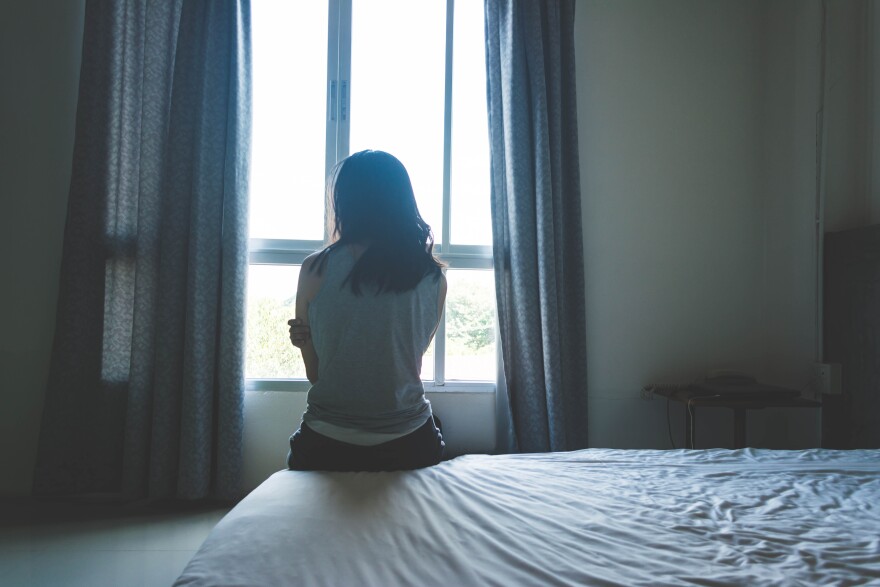Gov. Ron DeSantis has signed a package of bills aimed at combating human trafficking in Florida. The bills will strengthen penalties for trafficking, increase training and support victims. He signed the bills in a ceremony attended by state leaders last week.
“What we’ve seen across the country, including here in Florida, is rates of human trafficking increasing,” he said. “Last year, across the country, there was a 50 percent increase in arrests for human trafficking.”
The legislative package drew a mixed response from human rights advocates. Some are concerned that it doesn’t go far enough.
Training people in what to look for is crucial in curbing trafficking, says Robin Hassler Thompson, executive director of the Survive and Thrive Advocacy Center in Tallahassee. She pushes to train people in all walks of life, saying human trafficking is far more widespread than is understood.
“Because often people say, ‘See something, say something.’ Well, if you don’t know what you’re looking at, if you think only girls are sex-trafficked and there’s a boy there, or if you think only immigrants are trafficked and American citizens are being trafficked, you’re not going to see them,” she said. “So it’s so important to have training across the board. So that’s one of the things that we do here.”
One of the bills DeSantis signed, Senate Bill 1690, would require the state Department of Children and Families to conduct more oversight of adult safe homes and tighten standards for hotels and motels where trafficking may be taking place.
There are currently 13 safe houses statewide that serve adult survivors of human trafficking, according to a Senate staff analysis. DCF hasn’t been regulating or monitoring any of them, and the law hasn’t required it. But under the bill, DCF will be required to certify adult safe houses, inspect and re-certify them every year. The measure was sponsored by Republican Rep. Michelle Salzman of Escambia County.
“It creates adult safe house standards in requiring certification for providers of adult safe houses,” Salzman said. “It provides for age-appropriate education and public awareness at certain homes, and it creates enforcement standards for hotel training and signage.”
The measure also requires security for safe houses. Florida will be the first state to certify adult safe houses, says Terry Coonan, executive director of the Center for the Advancement of Human Rights at Florida State University. He says it’s hugely important…
“Because we have so many young women, in particular, who age out that have been engaged -- often exploited -- in human trafficking before the age of 18,” Coonan said. “After they turn 18, unless they’ve already been in the care of the Department of Children and Families, there is really a dearth of services for them.”
The bill would also tighten standards for hotels and motels where human trafficking may be taking place. The requirement is that the hotels and motels display signs that say human trafficking won’t be tolerated on their premises and train their employees accordingly.
Currently, Florida law gives hotels and motels 90 days to correct training or awareness deficiencies when they are found to be out of compliance. Under the bill, that period would be shortened to 45 days. Here’s Coonan:
“This is very much a result of the Sun-Sentinel investigation earlier this year that pointed out that there have been no fines basically received by our Florida government despite back in 2019 a very intentional fine system being set up for hotels and motels that are not conforming to this requirement,” he said.
The establishments won’t be eligible for a second correction period after a second violation -- so they’re more likely to be fined under this measure. The National Human Trafficking Hotline found that 75 percent of trafficking survivors reported coming into contact with hotels and motels at some point while being trafficked.
Robin Hassler Thompson of the Survive and Thrive Advocacy Center is glad the state is more focused on preventing human trafficking, but says there’s much more to do.
“What I’d like to hope and see this year and every year is funding for grassroots programs like ours that are doing the specific work in our communities on the ground to provide direct assistance to survivors when they’re identified and when they’re there as well as victim witnesses to help put some of these people behind bars,” she said.
Coonan and Hassler Thompson say it’s not only important to prevent trafficking and punish traffickers. It’s also necessary to respect the trauma that survivors have experienced and offer them support and services.
For more information, call the National Human Trafficking Resource Center at (888) 373-7888
Survive and Thrive Advocacy Center at (850) 597-2080
stac@surviveandthriveadvocacy.org
Welcome to STAC (surviveandthriveadvocacy.org)






